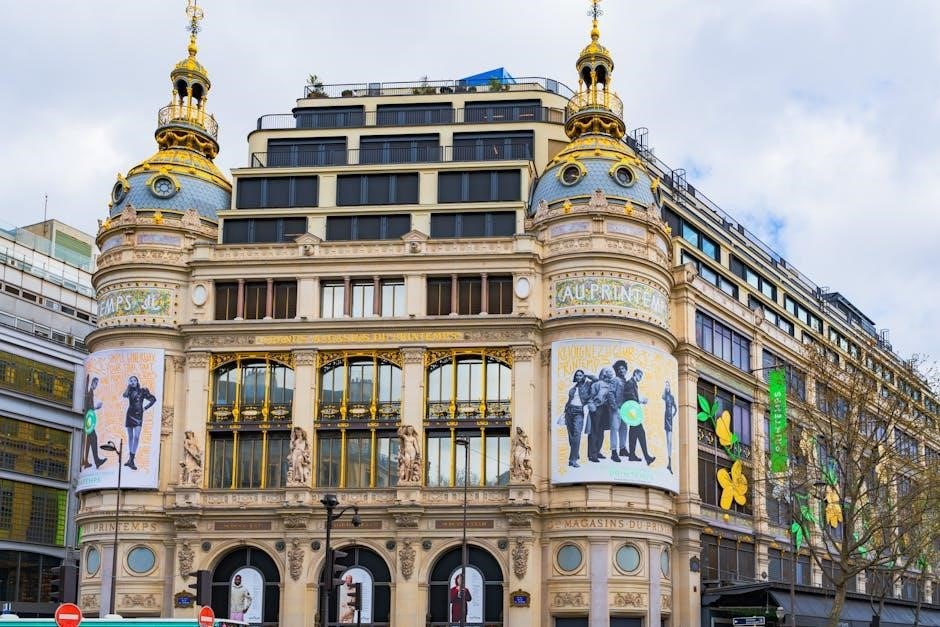The Arab Spring was a series of anti-government protests and uprisings that swept across the Middle East and North Africa‚ beginning in late 2010. It sought democratic reforms‚ social justice‚ and an end to corruption‚ sparking widespread political and social change. Literature played a crucial role in documenting these events‚ offering insights into the aspirations and struggles of the people. Books like Les printemps arabes by Arnaud Lacheret and Le roman des Printemps arabes by Tahar Ben Jelloun provide deeper understanding. These works‚ often available in PDF formats‚ highlight the movement’s historical significance and its lasting impact on the region.
Overview of the Arab Spring and Its Historical Context
The Arab Spring began in late 2010‚ sparked by protests in Tunisia‚ spreading across the Arab world. It was driven by demands for democracy‚ social justice‚ and an end to corruption. Literature played a key role in capturing these events‚ with works like Les printemps arabes by Arnaud Lacheret and Le roman des Printemps arabes by Tahar Ben Jelloun offering insights into the movement’s ideals and challenges. These books‚ available in PDF‚ provide historical context‚ exploring the roots of the uprisings and their impact on the region. They highlight the aspirations of the people and the complexities of the Arab Spring‚ becoming essential resources for understanding this pivotal moment in modern history.
The Role of Literature in Documenting the Arab Spring
Literature played a vital role in documenting the Arab Spring‚ serving as a powerful medium for expression and reflection. Books such as Les printemps arabes by Arnaud Lacheret and Le roman des Printemps arabes by Tahar Ben Jelloun captured the essence of the uprisings‚ offering personal and societal perspectives. These works‚ available in PDF‚ provide detailed narratives of the events‚ allowing readers to understand the historical context and emotional depth of the movement. Literature not only preserved the stories of those involved but also became a tool for political commentary and social critique. By giving voice to the struggles and aspirations of the people‚ these books have become essential resources for understanding the Arab Spring’s impact and legacy.

Key Books on the Arab Spring in PDF Format
Notable books like Les printemps arabes by Arnaud Lacheret and Le roman des Printemps arabes by Tahar Ben Jelloun are essential reads‚ available in PDF format‚ offering insights into the Arab Spring’s history and impact.
“Les printemps arabes” by Arnaud Lacheret
Les printemps arabes by Arnaud Lacheret is a captivating analysis of the Arab Spring‚ offering a comprehensive exploration of its historical and political dimensions. Published as part of the Concours commun IEP 2020‚ this work provides a detailed account of the uprisings‚ emphasizing the region’s transformation and the quest for democracy. Lacheret’s insightful prose delves into the complexities of the movement‚ highlighting its impact on both local and global stages. Available in PDF format‚ this book serves as a valuable resource for scholars and enthusiasts alike‚ shedding light on the Arab Spring’s significance and its enduring legacy in shaping the modern Arab world.
“Le roman des Printemps arabes” by Tahar Ben Jelloun
Tahar Ben Jelloun’s Le roman des Printemps arabes is a poignant literary work that captures the essence of the Arab Spring through the story of a simple man who becomes a catalyst for change. The book‚ available in PDF format‚ explores themes of resilience‚ dignity‚ and the struggle for justice‚ resonating deeply with the experiences of millions across the Arab world. Ben Jelloun’s narrative masterfully weaves personal and collective histories‚ offering a humanistic perspective on the uprisings. This novel not only documents the events but also reflects on their broader implications‚ making it a vital read for understanding the emotional and social dynamics of the Arab Spring.
“Un printemps arabe” by Jacques Benoist-Méchin
Jacques Benoist-Méchin’s Un printemps arabe‚ published in 1959‚ is a historical work that glorifies the rise of Gamal Abdel Nasser and the Arab nationalist movement. Although written decades before the 2010 uprisings‚ the book’s title and themes resonate with the broader concept of an “Arab Spring.” It explores the political and cultural shifts in the Arab world‚ offering insights into the region’s aspirations for unity and modernization. The book‚ available in PDF format‚ provides a historical perspective on Arab nationalism‚ contrasting with the democratic movements of the 21st century. Benoist-Méchin’s work remains a valuable resource for understanding the evolution of Arab political thought and its enduring legacy.

Historical and Political Context of the Arab Spring
The Arab Spring emerged from decades of authoritarian rule‚ corruption‚ and social inequality‚ fueled by economic hardship and a desire for democratic reforms. Protests began in Tunisia‚ spreading rapidly across the Arab world‚ challenging long-standing regimes and sparking political upheaval. These events were deeply rooted in historical tensions and modern aspirations‚ as documented in works like Les printemps arabes by Arnaud Lacheret‚ available in PDF format‚ which explores the complexities of the movement and its far-reaching implications.
The Rise of Democratic Movements in the Arab World
The Arab Spring marked the rise of democratic movements across the Arab world‚ fueled by widespread discontent with authoritarian regimes‚ corruption‚ and social inequality. Protests began in Tunisia‚ sparked by Mohamed Bouazizi’s self-immolation‚ and quickly spread to Egypt‚ Libya‚ Yemen‚ and Syria. These movements demanded political reform‚ freedom of speech‚ and an end to oppressive governance. Literature played a vital role in chronicling these events‚ as seen in works like Le roman des Printemps arabes by Tahar Ben Jelloun‚ available in PDF format. These books highlight the struggles and aspirations of the people‚ offering insights into the historical and cultural context of the uprisings. The movement’s impact was profound‚ challenging long-standing regimes and inspiring hope for democratic change‚ despite the challenges that followed.
The Impact of the Arab Spring on Global Politics
The Arab Spring significantly influenced global politics by challenging authoritarian regimes and inspiring similar movements worldwide. It demonstrated the power of grassroots activism and social media in mobilizing dissent. The uprisings led to shifts in international relations‚ as global powers navigated the complexities of supporting democratic change while maintaining strategic interests. Books like Le roman des Printemps arabes by Tahar Ben Jelloun and Les printemps arabes by Arnaud Lacheret‚ available in PDF formats‚ provide insights into how these events reshaped global perceptions of democracy and governance. The movement’s legacy continues to influence political discourse‚ emphasizing the importance of accountability and human rights on a global scale.

Regional Perspectives on the Arab Spring
The Arab Spring’s impact varied across regions‚ with Tunisia emerging as a success story‚ while Egypt faced political turmoil. Libya‚ Syria‚ and Yemen descended into conflict‚ as documented in PDF works like Le roman des Printemps arabes and Les printemps arabes‚ highlighting diverse regional trajectories and their lasting effects on governance and stability.
Egypt: The Fall of Mubarak and Its Aftermath
Egypt: The Fall of Mubarak and Its Aftermath
Egypt’s Arab Spring began with mass protests in Cairo’s Tahrir Square in January 2011‚ leading to the ousting of President Hosni Mubarak after three decades in power. The military assumed control‚ promising reforms‚ but the transition was marked by political instability. Mohammed Morsi‚ the first democratically elected president‚ was toppled in 2013 by Abdel Fattah el-Sisi‚ who reinstated military rule. This period of upheaval is documented in works like Le roman des Printemps arabes‚ which explores the struggle for democracy and justice. The aftermath highlights Egypt’s ongoing challenges with governance‚ human rights‚ and societal divisions‚ as captured in various PDF analyses and literary works.
Tunisia: The Birthplace of the Arab Spring
Tunisia: The Birthplace of the Arab Spring
Tunisia is widely regarded as the birthplace of the Arab Spring‚ where the self-immolation of Mohammed Bouazizi in December 2010 ignited widespread protests. These demonstrations led to the ousting of President Zine El Abidine Ben Ali‚ ending his 23-year rule. Tunisia’s transition was relatively peaceful compared to other Arab Spring countries‚ resulting in a democratic constitution and free elections. Literary works like Le roman des Printemps arabes by Tahar Ben Jelloun capture the essence of this revolution‚ while PDF analyses highlight Tunisia’s unique path to democracy. The country’s experience serves as a complex yet hopeful example of political transformation in the Arab world‚ documented in various academic and literary sources.
Libya‚ Syria‚ and Yemen: The Consequences of Uprising
Libya‚ Syria‚ and Yemen: The Consequences of Uprising
The uprisings in Libya‚ Syria‚ and Yemen during the Arab Spring led to devastating consequences. In Libya‚ the overthrow and killing of Muammar Gaddafi plunged the country into chaos‚ with rival factions and foreign intervention fueling ongoing civil war. Syria’s uprising escalated into a brutal civil war‚ drawing in global powers and resulting in massive civilian casualties and displacement. Yemen’s revolution led to the ousting of President Ali Abdullah Saleh‚ but the country descended into a protracted conflict between Houthi rebels and a Saudi-led coalition‚ exacerbating humanitarian crises. Literary works‚ such as those by Tahar Ben Jelloun and Jacques Benoist-Méchin‚ available in PDF‚ offer critical insights into these complex struggles and their lasting regional impact.

Cultural and Social Impact of the Arab Spring
The Arab Spring deeply influenced culture and society‚ fostering new literary voices and artistic expressions. Literature played a pivotal role in documenting the uprisings‚ shaping public opinion‚ and giving voice to emerging writers. Books like Les printemps arabes and Le roman des Printemps arabes‚ available in PDF‚ highlight the transformative power of storytelling in capturing the region’s aspirations and struggles.
The Role of Literature and Art in Shaping Public Opinion
Literature and art played a crucial role in shaping public opinion during the Arab Spring‚ offering powerful narratives that captured the essence of the uprisings. Books like Les printemps arabes by Arnaud Lacheret and Le roman des Printemps arabes by Tahar Ben Jelloun‚ available in PDF‚ provided deep insights into the struggles and aspirations of the people. These works not only documented the events but also influenced how the world perceived the movement. Through vivid storytelling and critical analyses‚ literature became a tool for expressing dissent and fostering solidarity. Art‚ in various forms‚ further amplified these messages‚ creating a cultural resonance that continues to impact societal views and political discourse long after the uprisings began.
The Emergence of New Voices in Arab Literature
The Emergence of New Voices in Arab Literature
The Arab Spring catalyzed the emergence of new voices in Arab literature‚ as writers began to explore themes of revolution‚ identity‚ and social change. Authors like Tahar Ben Jelloun and Arnaud Lacheret gained prominence‚ offering fresh perspectives on the uprisings. Their works‚ often available in PDF formats‚ provided a platform for marginalized voices‚ shedding light on the struggles and aspirations of the people. This literary movement not only reflected the political turmoil but also enriched Arab literature with diverse narratives. The rise of these voices underscored the power of literature as a medium for expressing dissent and fostering cultural understanding‚ leaving a lasting legacy in the post-Arab Spring era.
The Arab Spring left an indelible mark on the Middle East and North Africa‚ reshaping political landscapes and inspiring new cultural expressions. Literature played a pivotal role in capturing the essence of this movement‚ with works like Les printemps arabes and Le roman des Printemps arabes providing profound insights. These books‚ available in PDF formats‚ chronicle the struggles‚ hopes‚ and transformations of the region. The legacy of the Arab Spring is complex‚ marked by both progress and setbacks‚ but its impact on literature and societal discourse remains undeniable. These writings serve as a testament to the power of storytelling in preserving history and inspiring future generations to pursue justice and freedom.

Leave a Reply
You must be logged in to post a comment.